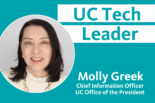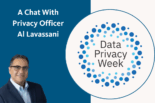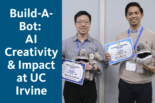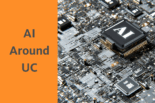By Jeané Blunt. The University of California is one of the leading academic research enterprises in the world. Almost all of the industries in which California is a world leader – biotechnology, telecommunications, digital media, computers and semiconductors, and environmental technologies – grew out of university-based research.
Here are a few stories from external publications that highlight recent discoveries based in UC IT research:
Four Top Health Systems Share Novel Approaches to Improve Patient Engagement
Hospitals and health systems across the US are seeking ways to better engage patients with a variety of technologies to improve patient experience and health outcomes. How do you use technology to transform the hospital bedside? Increase medication adherence for hypertension? Control diabetes? Reduce distress in patients with cancer? Four health care organizations, including UC San Diego Health, are developing approaches to these questions. Ming Tai Seale, professor of family medicine and public health at the UC San Diego School of Medicine, is lead author of an article that offers a case study of successful approaches that can be replicated nationally. Read the article, “Four Top Health Systems Share Novel Approaches to Improve Patient Engagement,” in Medical Xpress.
Students Are Using Mobile Even If You Aren’t
Smartphones and tablets are changing how teachers teach and students learn. Beyond its function as a classroom tool, mobile technology is the primary conduit for some students’ learning experiences. Increasingly, students expect course materials to be as accessible to them on mobile devices as on a laptop. Two years ago, four instructional designers in the UC system decided to do a research project on “mobile learning.” Read the article, “Students Are Using Mobile Even If You Aren’t,” in Inside Higher Ed.
More Seniors Embrace Technology. But Can They Use It?
We’re told older adults are embracing technology more than ever before. Still we all know at least one older person who can barely text, let alone maneuver mobile apps. So while they may be purchasing laptops, smart phones, and tablets, many older adults don’t feel confident about using them. In a study led by Shengzhi Wang of the Design Lab at UC San Diego, researchers convened two focus groups at a local retirement community to explore both barriers and facilitators to technology adoption, as well as privacy concerns and any interest participants might have in helping companies design the technology that could serve them. Read the article, “More Seniors Are Embracing Technology. But Can They Use It? UCSD Researchers Suggest Asking Them,” in Forbes.
Teen Tech Time Not to Blame for Poor Mental Health
A new study suggests the time teens invest on their phones does not have an adverse affect on their mental health. In the study, researchers surveyed more than 2,000 adolescents. They analyzed whether participants who engaged more with digital technologies were more likely to experience later mental health symptoms, and whether the days in which adolescents spent more time using digital technology for a range of purposes were also days when mental health problems were more common. The answer in both cases was no. “It may be time for adults to stop arguing over whether smartphones and social media are good or bad for teens’ mental health and start figuring out ways to best support them in both their offline and online lives,” said co-author, Candice Odgers, a professor at UC Irvine and Duke University. Read the article, “Teen Tech Time Not to Blame for Poor Mental Health,” in Geek.com.
 Jeané Blunt is IT communications and UC FCC licensing coordinator at UC Office of the President.
Jeané Blunt is IT communications and UC FCC licensing coordinator at UC Office of the President.







